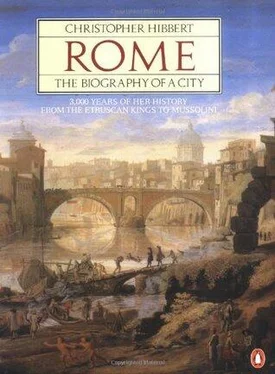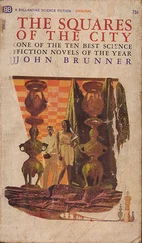Christopher Hibbert - Rome. The Biography of the City
Здесь есть возможность читать онлайн «Christopher Hibbert - Rome. The Biography of the City» весь текст электронной книги совершенно бесплатно (целиком полную версию без сокращений). В некоторых случаях можно слушать аудио, скачать через торрент в формате fb2 и присутствует краткое содержание. Жанр: Культурология, Искусство и Дизайн, на английском языке. Описание произведения, (предисловие) а так же отзывы посетителей доступны на портале библиотеки ЛибКат.
- Название:Rome. The Biography of the City
- Автор:
- Жанр:
- Год:неизвестен
- ISBN:нет данных
- Рейтинг книги:3 / 5. Голосов: 1
-
Избранное:Добавить в избранное
- Отзывы:
-
Ваша оценка:
- 60
- 1
- 2
- 3
- 4
- 5
Rome. The Biography of the City: краткое содержание, описание и аннотация
Предлагаем к чтению аннотацию, описание, краткое содержание или предисловие (зависит от того, что написал сам автор книги «Rome. The Biography of the City»). Если вы не нашли необходимую информацию о книге — напишите в комментариях, мы постараемся отыскать её.
Rome. The Biography of the City — читать онлайн бесплатно полную книгу (весь текст) целиком
Ниже представлен текст книги, разбитый по страницам. Система сохранения места последней прочитанной страницы, позволяет с удобством читать онлайн бесплатно книгу «Rome. The Biography of the City», без необходимости каждый раз заново искать на чём Вы остановились. Поставьте закладку, и сможете в любой момент перейти на страницу, на которой закончили чтение.
Интервал:
Закладка:
North of the Basilica Julia, built as an integral part of the Forum of Caesar, was the Temple of Venus the Mother, Venus Genetrix, 6from whom Caesar's family claimed to be descended. Outside the temple stood an equestrian statue of Caesar himself, the horse, by Lysippus, taken from a monument of Alexander the Great; and inside was a statue by Arcesilaus of Venus with her breasts adorned with pearls. Beside it was a gilt-bronze statue of Cleopatra.
The Egyptian queen had come to Rome with her son, Caesarion, ostensibly to ratify a treaty of alliance, but in reality to be with her lover, who installed her in great luxury in a house on the east bank of the Tiber beneath the Aventine hill. Her ‘insolence’ while she was staying there enraged Cicero who confessed to his friend, Atticus, that he detested her; and Cicero was far from being alone in his intense dislike of her and in his distrust of the man upon whose protection she relied. Those who attributed to her influence Caesar's plans to establish public libraries on the Egyptian model in Rome, and his appointment of an Egyptian astronomer to supervise the revision of the dislocated Roman calendar, could not complain that her influence was malign; but other innovations, such as religious rituals practised in Alexandria where rulers were worshipped as gods, seemed to many of Caesar's critics clear evidence of his desire to become a godlike ruler himself.
Caesar's achievements could not be denied. For instance, by resettling the workless destitute of Rome, as well as former legionaries, in foreign colonies he did much to alleviate the problems of poverty and unemployment in the city; and by increasing the number of Senators and widening the areas in Italy from which they could be chosen, he made the Senate a far more representative body than it had formerly been. Yet he contrived at the same time alarmingly to increase his own personal power. He had a law passed enabling him personally to choose candidates for high office; he adopted the title Imperator , signifying his supreme command of the armed forces of Rome; he then had himself appointed Dictator in Perpetuity, the letters signifying his elevation to this new office being stamped around his profile on the coinage of Rome, which for the first time bore the image of a living citizen. His striking features were also to be seen in numerous portrait busts, fine examples of an art form in which the Romans now excelled; and these were displayed throughout the city and its surrounding provinces. It was whispered that he would soon revive the kingship; and the rumours were intensified when two staunchly Republican Tribunes of the People, who had removed a diadem from the head of the Dictator's statue and had arrested the ringleaders of a crowd which hailed Caesar as king, were deposed by the servile Senate.
In the hope of putting an end to these reports of his unbridled ambition, Caesar arranged with Mark Antony to make a public display in the Forum of his loyalty to the Republic. The occasion, so Plutarch related, was the festival of the Lupercalia held in February in honour of the fertility god Faunus: ‘At this time many of the magistrates and young men of noble families run through the city naked; and in their jesting and merry-making strike those whom they meet with thongs. And many women of high rank purposely stand in their way, holding out their hands to be struck like schoolchildren, believing that they will be granted an easy delivery if pregnant or become fertile if barren.’ Caesar, sitting on a golden throne above the Rostra and wearing a triumphal robe, watched this ceremony; and Antony, who was the Dictator's fellow-Consul and one of the priests of the Lupercalia, took part in the sacred running. When he came to the Forum the crowd made way for him. He was carrying a diadem with a wreath of laurel round it, which he held out to Caesar, who twice ostentatiously pushed it away.
Caesar's action was cheered by the crowds in the Forum. But the stories about his ambitions persisted; and, when it became known that he was to embark upon an expedition against the Parthians and had appointed his own political supporters with plenipotentiary powers to represent him while he was away, the opposition against him crystallized. At the centre of the plot to dispose of him were Gaius Cassius Longinus, a proud and hot-tempered soldier who was bitterly disappointed in not being given a command in the Parthian expedition; an impoverished follower of Cassius, Publius Casca; and Cassius's brother-in-law, Marcus Brutus, a former devoted protégé of Caesar and, so some people claimed, his illegitimate son. A fervent Republican, he was inordinately proud of his supposed descent from that Brutus who had deposed the last of the Etruscan kings of Rome.
Caesar, while recognizing well enough that he was far from universally admired or liked, seemed to discount all warnings that he might be in danger. Indeed, he disdainfully remained seated when one day a delegation of Senators came to present him with various laudatory decrees, and he went so far as to disband his personal bodyguard.
On 15 March 44 B.C., shortly before he was due to leave for his campaign against the Parthians, he attended a meeting of the Senate in the Curia Pompeia, an assembly hall attached to the Theatre of Pompey. 7As Caesar approached the hall a man pushed a note of warning into his hand, but he did not trouble to read it. He entered the building alone and defenceless, Mark Antony, who had accompanied him thus far, being detained at the door in conversation by one of the conspirators. Other conspirators crowded round him as he walked towards his chair, pretending to support a petition made to him by one Tullius Cimber on behalf of an exiled brother. Suddenly Tullius took hold of Caesar's toga with both hands and pulled it from his back as a signal for the attack. The first blow was struck by Casca who missed his aim and merely scratched Caesar just below the throat. Caesar jumped away, dragging his toga free and, grabbing Casca's knife with one hand, used the other to stab him in the arm with the point of his metal pen.
So it began. And, as the other conspirators crowded around Caesar, baring their daggers, those who were not in the conspiracy were so horror-struck that they stood transfixed while the victim, driven this way and that, was stabbed time and again until the white of his tunic was reddened with blood.
Some say that Caesar fought back against all the rest [wrote Plutarch], darting about to avoid the blows and crying out for help, but when he saw that Brutus had drawn his dagger, he covered his head with his toga and sank down to the ground. Either by chance or because he was pushed there by his murderers, he fell down against the pedestal on which the statue of Pompey stood, and the pedestal was drenched with his blood, so that one might have thought that Pompey himself was presiding over this act of vengeance against his enemy, who lay there at his feet struggling convulsively under so many blows.
Brutus stepped forward as though he wished to make a speech. But the Senators, unwilling to wait for him, rushed out of the building and fled to their homes, their excitement and terror infecting the Roman people, some of whom bolted their doors while others ran from their homes and shops to see where the assassination had taken place.
As Antony went into hiding, Brutus and his collaborators, ‘still hot and eager from the murder’, marched to the Capitol, holding up their daggers in front of them, calling out that liberty had been restored and inviting distinguished people whom they met to join their procession. The next day Brutus made a speech which was listened to in complete silence, indicating, so Plutarch thought, that the people both pitied Caesar and respected Brutus. And, as though in recognition of this popular feeling, the Senate voted that there should be no alteration made in any of the measures passed by Caesar while in power, yet at the same time Brutus and his friends were given honours and high rewards. ‘Everyone thought, therefore, that matters were not only settled but settled in the best possible way.’
Читать дальшеИнтервал:
Закладка:
Похожие книги на «Rome. The Biography of the City»
Представляем Вашему вниманию похожие книги на «Rome. The Biography of the City» списком для выбора. Мы отобрали схожую по названию и смыслу литературу в надежде предоставить читателям больше вариантов отыскать новые, интересные, ещё непрочитанные произведения.
Обсуждение, отзывы о книге «Rome. The Biography of the City» и просто собственные мнения читателей. Оставьте ваши комментарии, напишите, что Вы думаете о произведении, его смысле или главных героях. Укажите что конкретно понравилось, а что нет, и почему Вы так считаете.












